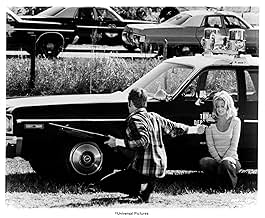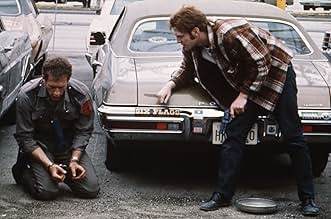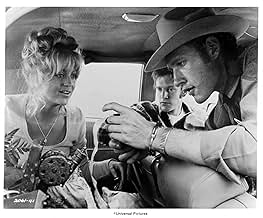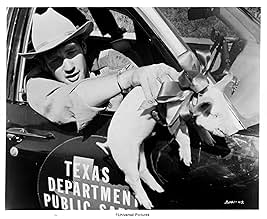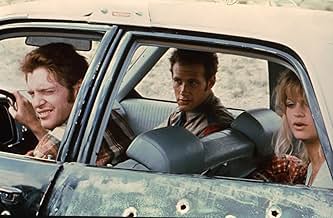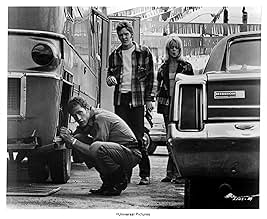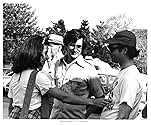VALUTAZIONE IMDb
6,7/10
20.850
LA TUA VALUTAZIONE
Una donna tenta di riunire la sua famiglia aiutando suo marito a scappare di prigione per rapire il figlio. Ma le cose non vanno come previsto e prendono in ostaggio.Una donna tenta di riunire la sua famiglia aiutando suo marito a scappare di prigione per rapire il figlio. Ma le cose non vanno come previsto e prendono in ostaggio.Una donna tenta di riunire la sua famiglia aiutando suo marito a scappare di prigione per rapire il figlio. Ma le cose non vanno come previsto e prendono in ostaggio.
- Regia
- Sceneggiatura
- Star
- Premi
- 2 vittorie e 6 candidature totali
Ken Hudgins
- Standby #1
- (as Kenneth Hudgins)
Buster Daniels
- Buster Daniels - Drunk
- (as Buster Danials)
James N. Harrell
- Mark Fenno
- (as Jim Harrell)
Recensioni in evidenza
There's something so incredibly fascinating about watching the humble beginnings of a director as renowned as Stephen Spielberg. The Sugarland Express is one of his earliest films and it is not of the calibre of films like Jaws, Close Encounters of the Third Kind, and the Indiana Jones franchise, but it still remarkably entertaining. It tells the story of two lovers who go on a mad run from the law in order to kidnap their son from his foster parents. Lou-Jean, played by Goldie Hawn, breaks her husband, Clovis, out of jail in order to do so and this sparks mad paranoia in the two. The run from the law doesn't occur until the two kidnap a policeman and his vehicle, forcing him to drive them to Sugarland, Texas in order to find their baby boy. This is a wild, exciting, often hilarious film, and to top it all off it's based on a true story.
I think what defines this film more than anything is the distinct new Spielberg smell. It has all of the things we recognize from the bigger Spielberg films, just on a much smaller scale. The dialogue flows so naturally and fits right in with the action and camera work of the film. There are lots of familiar camera techniques in the film, especially the fluid camera movement that goes on within the confines of the police vehicle, where a lot of the film takes place. Nothing is as grand and widespread as Spielberg's classics, but anyone who respects the genius can respect this film for what it is because, like it or not, this is where it all began.
But not only is The Sugarland Express a fascinating look into how Spielberg got his start, it is also just an incredibly fun film. Goldie Hawn plays the border line psychopath mother perfectly. She wants nothing more than to see her baby boy again, and she won't let anything stop her. The film hits both ends of the spectrum very nicely. A lot of it is very comedic, ranging from cleverly hilarious to downright goofy at times. Yet there are also moments of sincere dramatic tension. Through all of the offbeat wackiness, the film never forgets the situation it is dealing with. Despite everything, it is still two convicts running from the law, a subject that the characters must handle with care. And the film brings this to light very well, as it is very gripping at moments, and almost touching at others.
The Sugarland Express isn't much more than a very exciting adventure story with some enticing moments of drama thrown in, but you have to love it for that. It doesn't try to be much more and it pulls off everything it wants to deliver with a lot of talented finesse and grace. This is not a film to miss. It's only mistake was coming right before Jaws, a masterpiece that overshadowed it greatly, hence why we know that name, but few of us have heard of the pleasant little gem that is The Sugarland Express.
I think what defines this film more than anything is the distinct new Spielberg smell. It has all of the things we recognize from the bigger Spielberg films, just on a much smaller scale. The dialogue flows so naturally and fits right in with the action and camera work of the film. There are lots of familiar camera techniques in the film, especially the fluid camera movement that goes on within the confines of the police vehicle, where a lot of the film takes place. Nothing is as grand and widespread as Spielberg's classics, but anyone who respects the genius can respect this film for what it is because, like it or not, this is where it all began.
But not only is The Sugarland Express a fascinating look into how Spielberg got his start, it is also just an incredibly fun film. Goldie Hawn plays the border line psychopath mother perfectly. She wants nothing more than to see her baby boy again, and she won't let anything stop her. The film hits both ends of the spectrum very nicely. A lot of it is very comedic, ranging from cleverly hilarious to downright goofy at times. Yet there are also moments of sincere dramatic tension. Through all of the offbeat wackiness, the film never forgets the situation it is dealing with. Despite everything, it is still two convicts running from the law, a subject that the characters must handle with care. And the film brings this to light very well, as it is very gripping at moments, and almost touching at others.
The Sugarland Express isn't much more than a very exciting adventure story with some enticing moments of drama thrown in, but you have to love it for that. It doesn't try to be much more and it pulls off everything it wants to deliver with a lot of talented finesse and grace. This is not a film to miss. It's only mistake was coming right before Jaws, a masterpiece that overshadowed it greatly, hence why we know that name, but few of us have heard of the pleasant little gem that is The Sugarland Express.
I wasn't sure what to expect from this film. Fellow fans of Steven Spielberg advised me to see "Sugarland Express," so I bought the DVD. I'm glad I did it as it is one of Spielberg's best. He should have made films more along the lines of "Duel," "Jaws" and the above film. Being based upon a true story is a Feather in the films cap. The two main characters - played by Goldie Hawn and William Atherton - are very sympathetic in spite of their circumstances. She is planning to find their baby boy so they can be re-united. He is a convict serving a light sentence. They both help his breaking out of jail and after taking a police officer hostage, they lead the police of Texas on a state wide chase. The wife and her convict husband race against time so they can find their son. This has thoughtful moments and it isn't a hard- hitting film. There is some violence but it's fairly mild and minimal. The pace is good and the tension is sustained throughout. Ben Johnson does well as one of the senior police officers who leads the Dragnet. He is a tough man but he isn't totally lacking in compassion. The direction is some of the best from Steven Spielberg.
Steven Spielberg's theatrical feature film debut is a smartly crafted, expertly composed & skilfully executed adventure drama that clearly exhibits the legendary director's penchant for turning an on-screen moment into a larger-than-life event without ever going over the top and is also significant for marking the commencement of one of cinema's greatest collaborations.
Based on a true story, The Sugarland Express tells the story of a young woman who successfully breaks her husband out of prison to help her assist retrieving her child, about to be placed in the care of foster parents. Things soon take a turn for the unexpected when they're left with no choice but to take a patrolman hostage & are pursued by the police throughout their journey.
Directed by Steven Spielberg, the film wonderfully introduces many of his trademarks & themes that would continue to recur in his later works and is a solid work that has enough style & substance to keep the viewers engaged for the most part. Camera-work is dynamic, makes excellent angle choices & remains consistent throughout while editing steadily paces its narrative.
Coming to the acting department, the cast comprises of Goldie Hawn, Ben Johnson, William Atherton & Michael Sacks amongst which it's Hawn who chips in with the most impressive performance. Marking his first collaboration with Spielberg, John William provides a score that beautifully reflects the film's tone with tracks that are adventurous, light-hearted & at the same moment, slightly poignant.
On an overall scale, The Sugarland Express is one of Spielberg's highly underrated flicks & although far from a masterpiece, it's still a quality work of passionate filmmaking that's admirable for a number of things. Full of crowd-pleasing elements, presenting the then-young filmmaker refining his craft & an indication of greater things to come, The Sugarland Express is a must for Spielberg's fans as well as critics.
Based on a true story, The Sugarland Express tells the story of a young woman who successfully breaks her husband out of prison to help her assist retrieving her child, about to be placed in the care of foster parents. Things soon take a turn for the unexpected when they're left with no choice but to take a patrolman hostage & are pursued by the police throughout their journey.
Directed by Steven Spielberg, the film wonderfully introduces many of his trademarks & themes that would continue to recur in his later works and is a solid work that has enough style & substance to keep the viewers engaged for the most part. Camera-work is dynamic, makes excellent angle choices & remains consistent throughout while editing steadily paces its narrative.
Coming to the acting department, the cast comprises of Goldie Hawn, Ben Johnson, William Atherton & Michael Sacks amongst which it's Hawn who chips in with the most impressive performance. Marking his first collaboration with Spielberg, John William provides a score that beautifully reflects the film's tone with tracks that are adventurous, light-hearted & at the same moment, slightly poignant.
On an overall scale, The Sugarland Express is one of Spielberg's highly underrated flicks & although far from a masterpiece, it's still a quality work of passionate filmmaking that's admirable for a number of things. Full of crowd-pleasing elements, presenting the then-young filmmaker refining his craft & an indication of greater things to come, The Sugarland Express is a must for Spielberg's fans as well as critics.
After the success of Duel (which was really a TV movie) Sugarland Express (Spielberg's first feature film) flopped at the box office, though it received a reasonably warm critical response. In fact this is a great little movie for all kinds of reasons.
If you're interested in Spielberg as a director this is fascinating as it begins to lay out most of the themes that have driven his work ever since - family (especially divided and dysfunctional families), childhood, parenthood, outsiders, America and Americana etc. It's also a really interesting piece in terms of his developing style. This is the first Hollywood film in which panaflex cameras were used allowing Spielberg to produce fantastically elaborate and fluid shots even in the confines of a car (see the superb 360 pan fixed on Ben Johnson's car when he first talks to the Poplins)- a kind of cinematography that has become a hall mark of Spielberg's, as have the rising crane shots and extended tracking shots that pepper the film. Spielberg skies and "God Light" (his term for shafts of light in mist/at night) also feature heavily.
It's also a really interesting if somewhat unrecognised influence on films like Thelma and Louise which seems to lift its basic structure and characters right out of this film. The way Ben Johnson's Captain Tanner equates to Harvey Keitel's police officer in Ridley Scott's film seems particularly close.
Fantastic performances all round too. Johnson, Horne and Atherton (a much under-used actor who has been largely wasted since, playing roles like the self serving journalist in the Die Hard films)particularly shine.
It's also very funny, sad and engaging from beginning to end. Can't recommend this one enough - especially if you're a Spielberg fan.
If you're interested in Spielberg as a director this is fascinating as it begins to lay out most of the themes that have driven his work ever since - family (especially divided and dysfunctional families), childhood, parenthood, outsiders, America and Americana etc. It's also a really interesting piece in terms of his developing style. This is the first Hollywood film in which panaflex cameras were used allowing Spielberg to produce fantastically elaborate and fluid shots even in the confines of a car (see the superb 360 pan fixed on Ben Johnson's car when he first talks to the Poplins)- a kind of cinematography that has become a hall mark of Spielberg's, as have the rising crane shots and extended tracking shots that pepper the film. Spielberg skies and "God Light" (his term for shafts of light in mist/at night) also feature heavily.
It's also a really interesting if somewhat unrecognised influence on films like Thelma and Louise which seems to lift its basic structure and characters right out of this film. The way Ben Johnson's Captain Tanner equates to Harvey Keitel's police officer in Ridley Scott's film seems particularly close.
Fantastic performances all round too. Johnson, Horne and Atherton (a much under-used actor who has been largely wasted since, playing roles like the self serving journalist in the Die Hard films)particularly shine.
It's also very funny, sad and engaging from beginning to end. Can't recommend this one enough - especially if you're a Spielberg fan.
The first theatrical feature by Spielberg, his last as just another director before "Jaws," this story is saddled by what I call an 'idiot's resolve' plot. This means the main characters behave like complete idiots and, in real life, wouldn't get two steps in the direction they're going, much less the miles of roadway managed in this pic. But - and this is an important point - the story is supposedly based on a real life incident, which means such theorizing may not apply here. It all depends on how much Spielberg and the writers exaggerated events, which I tend to think was quite a bit. The story is jump-started in that a 2-year old baby is placed in foster care; the real parents (Hawn & Atherton), small-time criminals, won't have it and break the father's incarceration to set out for the foster home. But, from the outset, these two are presented as such obvious losers, I was hoping they'd never reach the kid. The father, for example, has only 4 months remaining of post-prison time to do; in short order, the idiot couple's transgressions escalate from auto theft to kidnapping of a cop (Sacks). In essence, they quickly sabotaged any chance for themselves of getting the kid back in a happy fashion.
I also got the impression Spielberg was poking a lot of fun at Texas and Texacans in general, where this takes place. Besides the two idiotic so-called parents, most everyone else is also presented as a buffoon, a country hick with no clue. The more sinister examples are those who live for the opportunity to shoot someone - this is gun country, after all. The only one who escapes with his dignity intact is the police captain, well played by Ben Johnson. There are traces of the imagery and poignancy which many of Spielberg's later pictures would be laced with. There's the absurdity of that long, very long line of police vehicles, lights flashing, following that one car with the fugitives (I guess no other crimes needed attention in the county that day?). And the sudden look on Atherton's face when he watches a Road Runner cartoon is amazing. But these are a few instances far and between in an ambling picture. Hawn is immensely likable, of course, but in the end she comes off as an idiotic screaming shrew who directly causes bad stuff to happen. Maybe it's just me, but I don't really like women such as this. But then, if this is true-to-life, Spielberg captured some sense of an unpleasant reality we have no control over. It just didn't retain such a consistency through the entire movie.
I also got the impression Spielberg was poking a lot of fun at Texas and Texacans in general, where this takes place. Besides the two idiotic so-called parents, most everyone else is also presented as a buffoon, a country hick with no clue. The more sinister examples are those who live for the opportunity to shoot someone - this is gun country, after all. The only one who escapes with his dignity intact is the police captain, well played by Ben Johnson. There are traces of the imagery and poignancy which many of Spielberg's later pictures would be laced with. There's the absurdity of that long, very long line of police vehicles, lights flashing, following that one car with the fugitives (I guess no other crimes needed attention in the county that day?). And the sudden look on Atherton's face when he watches a Road Runner cartoon is amazing. But these are a few instances far and between in an ambling picture. Hawn is immensely likable, of course, but in the end she comes off as an idiotic screaming shrew who directly causes bad stuff to happen. Maybe it's just me, but I don't really like women such as this. But then, if this is true-to-life, Spielberg captured some sense of an unpleasant reality we have no control over. It just didn't retain such a consistency through the entire movie.
Lo sapevi?
- QuizThis is the first movie to feature a tracking shot (front seat to back) and a 360-degree pan with dialogue from within a car, made possible by the new Panaflex Camera (1972), which was intended to be first used by Clint Eastwood in his directorial debut, Brivido nella notte (1971), but wasn't ready in time.
- BlooperWhile the Border Patrol's purpose is indeed to protect the United States against illegal entry and not vice versa, they are still a law enforcement agency that can be called upon to assist other state or federal agencies (as depicted in the film) to prevent wanted felons fleeing the United States jurisdiction during a pursuit. This has happened numerous times in reality and as such they are completely justified in firing at Clovis's car during their attempted escape.
- Citazioni
Clovis Poplin: We're in real trouble.
Clovis Poplin: Say, I didn't mean what I said.
Maxwell Slide: What was that?
Clovis Poplin: When I called you a son of a bitch, I didn't mean it
Maxwell Slide: And you ain't no mental subject neither.
- Curiosità sui creditiEpilogue: "Lou Jean served 15 months of a five-year prison term following her parole. She convinced the authorities that she was fit and able to take care of baby Langston. They are now living quietly in a small West Texas town. Captain Tanner and Officer Slide are still serving with the Texas Department of Public Safety."
- ConnessioniFeatured in At the Movies: Special Show: The Magic of Spielberg (1984)
- Colonne sonoreThe Eyes of Texas
(uncredited)
Written by John Lang Sinclair
[Played by marching band when the car enters Rodrigues, Texas]
I più visti
Accedi per valutare e creare un elenco di titoli salvati per ottenere consigli personalizzati
- How long is The Sugarland Express?Powered by Alexa
Dettagli
- Data di uscita
- Paese di origine
- Lingua
- Celebre anche come
- Loca evasión
- Luoghi delle riprese
- San Antonio, Texas, Stati Uniti(Harlandale ISD Stadium & Military Drive)
- Aziende produttrici
- Vedi altri crediti dell’azienda su IMDbPro
Botteghino
- Budget
- 3.000.000 USD (previsto)
- Lordo Stati Uniti e Canada
- 7.500.000 USD
- Lordo in tutto il mondo
- 7.505.037 USD
- Tempo di esecuzione1 ora 50 minuti
- Colore
- Proporzioni
- 2.39 : 1
Contribuisci a questa pagina
Suggerisci una modifica o aggiungi i contenuti mancanti

Divario superiore
By what name was Sugarland Express (1974) officially released in India in English?
Rispondi


